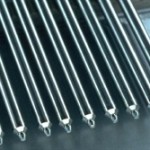 In the continuing saga of the Fukushima Dai-ichi nuclear power plant struggles, soil samples in two of five locations around the plant have turned up low levels of plutonium. What does this mean with regard to the situation that is playing out in Fukushima? How does this change the risks of contamination both domestically and internationally?
In the continuing saga of the Fukushima Dai-ichi nuclear power plant struggles, soil samples in two of five locations around the plant have turned up low levels of plutonium. What does this mean with regard to the situation that is playing out in Fukushima? How does this change the risks of contamination both domestically and internationally?
The first thing is that nobody should really be surprised that they’ve found plutonium. Yes, it’s a concern, but they were almost 100% sure of a containment breach already. The presence of small amounts of localized plutonium really doesn’t do much more than assure two things:
- There has been at minimum a partial meltdown of rods in one or more reactors
- There has been at minimum a containment breach in one or more reactors
In other words, it just confirms what everybody has already “known” with a great degree of certainty already. We already got the bad news thanks to the presence of various isotopes of iodine and cesium. Adding plutonium to the mix really doesn’t change things, for the moment anyway. It does, certainly, add a bit of urgency to getting the situation under control. The longer the situation remains volatile, the greater the likelihood of significant contamination occurring.
Up to this point, we’ve been pretty lucky. Yes, there have been fires and a couple of small explosions, but in the grand scheme of things, the radiation released from the plant could have been a lot higher than it has been. The effects have been largely localized. Unlike Chernobyl, which had a very large amount of Cesium-137 spread over such vast areas of land as to make clean-up impossible, Fukushima has mostly had some relatively minor venting.
As long as operators are able to keep large-scale explosions from happening, the potential release of plutonium is likely to be contained to within a few kilometres of the plant. The reason for this is that plutonium is a heavy element. Because of its heavy weight, it does not widely disperse in the atmosphere. Venting of steam and evaporation of “hot” puddles will not cause plumes to contain significant amounts of plutonium.
This, of course, is welcome news for folks in North America. While it can be expected that minimal amounts of iodine, cesium and xenon may make it to the west coast of North America, it’s highly unlikely that any plutonium would disperse that far. As such, it’s very important that people not become unnecessarily concerned.
As it is, there are varying amounts of Plutonium-238, -239 and -240 spread out fairly evenly all over the world already, thanks to the forward thinking of nuclear scientists who did high-altitude nuclear weapons testing in the ’50s and ’60s. The amount of plutonium detected at Fukushima is in line with the normal background amounts. They have a good idea of the source in Fukushima being the reactors rather than weapons testing, however, because the isotope ratios produced by the reactors differ from what is expected from residual background radiation from testing.
What this all means is that, yes, the situation is serious and it could get a lot worse for folks in Japan before it gets better. That said, it’s still not a dire situation. I just hope they get a handle on it soon.
I dearly hope that Japan takes this opportunity to revise their marijuana laws. The people near Fukushima will need this medicine to help dealing with the health fall out. I’m not trying to be doom and gloom, I’m just saying that I know many cancer survivors who have been helped by marijuana. There are studies out of Spain that demonstrate that CBD, one of the components of Cannabis, can actually kill cancer cells. The people of Japan need options for the future, and right now if they possess 0.1 g they can go to jail for 5 years.
Cannabis can also be used to help clean up the earth. Cannabis is amazing at leaching heavy metals out of the soil. The technology, called Phytoremediation, is being used in the Ukraine to clean up the Chernobyl site. The plant draws the heavy metals up, traps them it its own cellular structure, and then be cut down and disposed of properly. Humic Acid, a large ring shaped organic molecule, is also handy at getting trace nutrients (and thus radioactive isotopes) absorbed into a plants. It’s extracted from a rock called leonardite.
Hemp energy can be part of the solution for a post-petroleum, post-Uranium economy. Thorium can also be part of this solution, as Thorium reactors (a real, working technology) do not create the long half-life Plutonium by-product that the Cold War military desired so much for bombs. Nor does it create depleted Uranium that the current military turns into artillery shells and scatters over foreign lands.
We the People of the World deserve better than this. We deserve to have access to appropriate technology, live in a peaceful world, and have the freedom to pursue happiness however we chose.